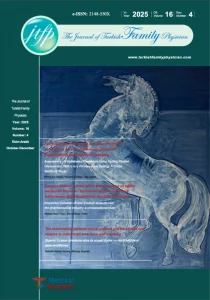The importance of breastmilk and the factors that effect exclusive breastfeeding
Breast milk is physiological food for a newborn baby for six months to meet almost all needs. Various socio-economic, cultural and personal factors are influential in deciding how to follow in her mother’s infant feeding. Breastfeeding mothers need information and support to initiate and continue breastfeeding successfully. Despite the numerous benefits of breast milk for both mother and her baby, breastfeeding initiation and exclusive breastfeeding for the first 6 months are still below the desired level in all around the world. Mothers need information and support to initiate and continue breastfeeding successfully. Support provided by professionals trained in breastfeeding to the mother, increase “exclusive breastfeeding” period.
Key words: breastfeeding, breastmilk, exclusive breastmilk, early weaning
References
- Stuebe AM, Rich-Edwards JW, Willett WC, Manson JE, Michels KB. Duration of lactation and incidence of type 2 diabetes. Jama 2005;294(20):2601-10.
- Kramer MS, Kakuma R. Optimal duration of exclusive breastfeeding. Cochrane Database Syst Rev 2012;8:Cd003517.
- Council N. The Infant Feeding Guidelines for Health Workers. Dietary Guidelines for Children and Adolescents in Australiain corporating. Commonwealth of Australia, Canberra, 2003.
- World Health Organization. Global Strategy on Infant and Young Child Feeding. Report by the Secretariat, FIFTY-FIFTH World Health Assembly, Infant and Young Child Nutrition. Geneva, Agendaitem, 2002.
- Gartner LM, Morton J, Lawrence RA, et al. Breastfeeding and the use of human milk. Pediatrics 2005;115(2):496-506.
- Coşkun T. Anne Sütü İle Beslenmenin Yararları. Katkı Pediatri Dergisi 2003;25(2):199-200.
- Kurtulus YE, Tezcan S. Türkiye Nüfus ve Sağlık Araştırması, Bebeklerin Beslenme Alışkanlıkları, Çocukların ve Annelerin Beslenme Durumu. 2003.
- Gür E. Anne Sütü İle Beslenme. Türk Pediatri Arşivi- Anne Sütü Özel Sayısı 2007; 42(1):11-5.
- Schack-Nielsen L, Michaelsen KF. Breast feeding and future health. Curr Opin Clin Nutr Metab Care 2006;9(3):289-96.
- Savino F, Lupica M. Breast milk: biological constituents for health and well-being in infancy. RecentiProgMed 2006;97(10):519-27.
- Özmert E. Erken Çocukluk Gelişiminin Desteklenmesi-I: Beslenme. Çocuk Sağlığı ve Hastalıkları Dergisi 2005;48(1):79-195.
- Anonymous. 3 New Reasons to Breastfeed. Health Medical Complete 2007;26(5):70.
- Thompson J. Breastfeeding: benefits and implications. Part two. Community Pract 2005;78(6):218-9.
- Giray H. Anne Sütü ile Beslenme. Sürekli Tıp Eğitimi Dergisi 2004;13(1):12-5.
- Türk R. 2-6 Aylık Bebeği Olan Annelerin Emzirmeyi Aile Planlaması Olarak Kullanma Durumları ve Etkileyen Faktörler. Ankara, Hacettepe Üniversitesi Yüksek Lisans Tezi, 2006.
- Erenel Ş. Doğum Sonrası Verilen Emzirme Eğitiminin Laktasyonel Amenore Sürecine Etkisi. Doktora Tezi. Ankara, Hacettepe Üniversitesi; 2004.
- İnce Z. Temel Yenidoğan Sağlığında Anne Sütünün Önemi ve Emzirme. Ankara, Baran Ofset, 2005: 37-9.
- UNICEF. Breastfeeding 2014 [cited 2014 4 August]. http://www.unicef.org/nutrition/index_24824.html. adresinden 13.12.2016 tarihinde erişilmiştir.
- http://www.cdc.gov.http://www.unicef.org/progressforchildren adresinden 13.12.2016 tarihinde erişilmiştir. [updated 16.3.15].
- http://www.cdc.gov/breastfeeding/pdf/2013breastfeedingreportcard.pdf. adresinden 13.12.2016 tarihinde erişilmiştir. [updated 17.3.15].
- Çifçili SY, Akgün TY, Akman M, Ünalan PC, Uzuner A, Kalaca S. Risk factors for early weaning among babies followed-up in a baby-friendly primary care unit in İstanbul. RISK 2011;66:71.
- Coşkun T. Laktasyonun Anatomi ve Fizyolojisi. Katkı Pediatri Dergisi 2003; 2(1):185-98.
- Scott JA, Binns CW. Factors associated with the initiation and duration of breastfeeding: a review of the literature. Breastfeed Rev 1999;7(1):5-16.
- Avery M, Duckett L, Dodgson J, Savik K, Henly SJ. Factors associated with very early weaning among primiparas intending to breastfeed. Matern Child Health J 1998;2(3):167-79.
- Taveras EM, Capra AM, Braveman PA, Jensvold NG, Escobar GJ, Lieu TA. Clinician support and psychosocial risk factors associated with breastfeeding discontinuation. Pediatrics 2003;112(1 Pt 1):108-15.
- Horta BL, Kramer MS, Platt RW. Maternal smoking and the risk of early weaning: a meta-analysis. Am J Public Health 2001;91(2):304-7.
- Hla MM, Novotny R, Kieffer EC, Mor J, Thiele M. Early weaning among Japanese women in Hawaii. J Biosoc Sci 2003;35(2):227-41.
- Berovic N. Impact of sociodemographic features of mothers on breastfeeding in Croatia: questionnaire study. Croat Med J 2003;44(5):596-600.
- Yang Q, Wen SW, Dubois L, Chen Y, Walker MC, Krewski D. Determinants of breast-feeding and weaning in Alberta, Canada. J Obstet Gynaecol Can 2004;26(11):975-81.
- Sheehan A, Schmied V, Cooke M. Australian women’s stories of their baby-feeding decisions in pregnancy. Midwifery 2003;19(4):259-66.
- Ünsal H, Altıhan F, Özkan H, Targan S, Hassoy H. Toplumda anne sütü verme eğilimi ve buna etki eden faktörler. Çocuk Sağlığı ve Hastalıkları Dergisi 2005; 48:226-33.
- Bertini G, Perugi S, Dani C, Pezzati M, Tronchin M, Rubaltelli FF. Maternal education and the incidence and duration of breast feeding: a prospective study. J Pediatr Gastroenterol Nutr 2003;37(4):447-52.
- American Academy of Pediatrics Policy Statement. Breasfeeding and the use of human milk. Pediatrics 2005;115:496-506.
- Forster D, McLachlan H, Lumley J, et al. ABFAB. Attachment to the breast and family attitudes to breastfeeding. The effect of breastfeeding education in the middle of pregnancy on the initiation and duration of breastfeeding: a randomised controlled trial [ISRCTN21556494]. BMC Pregnancy Childbirth 2003;3(1):5.
- Renfrew MJ, McCormick FM, Wade A, Quinn B, Dowswell T. Support for healthy breastfeeding mothers with healthy term babies. Cochrane Database Syst Rev 2012;5:Cd001141.
- Hill PD. Effects of education on breastfeeding success. Matern Child Nurs J 1987;16(2):145-56.
- Lumbiganon P, Martis R, Laopaiboon M, Festin MR, Ho JJ, Hakimi M. Antenatal breastfeeding education for increasing breastfeeding duration. Cochrane Database Syst Rev 2012;9:Cd006425.
- Rosen IM, Krueger MV, Carney LM, Graham JA. Prenatal breastfeeding education and breastfeeding outcomes. MCN Am J Matern Child Nurs 2008;33(5):315-9.
- Imdad A, Yakoob MY, Bhutta ZA. Effect of breastfeeding promotion interventions on breastfeeding rates, with special focus on developing countries. BMC Public Health 2011;11(3):S24.
- Onbaşı Ş, Duran R, Çiftdemir NA, Vatansever Ü, Acunaş B, Süt N. Doğum öncesi anne adaylarına verilen emzirme ve anne sütü eğitiminin emzirme davranışları üzerine etkisi. Türk Pediatri Arşivi 2011;46(1).
- Forster DA, McLachlan HL, Davey MA, et al. Ringing Up about Breastfeeding: a randomised controlled trial exploring early telephone peer support for breastfeeding (RUBY) – trial protocol. BMC Pregnancy Childbirth 2014;14:177.



